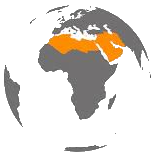
MENA

In the MENA region, information disorder exacerbates as it is feeded by political disorder. This flashpoint in the world witnessed a prolonged monopoly of media, which turned the media into a mouthpiece for authoritarian regimes. This monopoly of media is dismantled when social media emerged to erode the popularity of traditional media. Yet, social and new media shifted the problem and did not uproot it since the unstructured media creates and accelerates the spread of misinformation and disinformation. Over time, the ambit of social media was extended to political affairs, which contributed to the eruption of the Arab Spring revolutions and led authoritarian regimes and their opponents to shift to a strategy of targeting social media through torrents of bots, trolls, and rumors.
Based on the foregoing, The Arab Fact-Checkers Network (AFCN), led by the Arab Reporters for Investigative Journalism (ARIJ), is joing efforts again to identify the political, social, media and economic drivers of information disorder in 10 countries, mentioned below, in the region.
1.Jordan 2.Lebanon 3.Syria 4.Palestine 5.Egypt 6.Tunisia 7.Morocco 8.Libya 9.Yemen 10.Iraq
The team has already built up a network of local researchers from 10 countries in the MENA to identify the drivers and implications of information disorder. Right now, the researchers are conducting structured interviews with the actors who represent all stakeholders.
Work Mythology
The research typology is divided into two strategies; quantitative and qualitative methods. As the first stage of this study explores a multi-dimensional phenomenon in which a narrow-scale of parties is involved, the qualitative approach appropriates it. To perform qualitative research, a set of tools that comprises literature review, interviews, document research, focus groups and content analysis is utilized.
AFCN team
Rasha Faek is a professional editor with more than 12 years’ publishing experience. She is the managing editor at World Education Services (WES) and a consultant trainer at Arab Fact-Checkers Network (AFCN). Prior to that, Rasha worked at Al-Fanar Media, for around 9 years, serving variously as senior editor, managing editor, and the editor. Rasha has contributed to international publications such as USA Today and Bloomberg BAN.
Ahmed Ashour is an editor and fact checker at ARIJ. He completed a master program in International Media Studies at Bonn University, Germany. He holds the DW Academy-certified creditianial of the International Journalist. Ahmed Ashour had taken part in a number of cross-border collaborative programs with CiFAR, GIZ, ARIJ and OCCRP. Ashour participated in the collaborative project “Fincen Files” and “Pandora Papers” between ARIJ and ICIJ.
Arwa Kooli is a journalist since 2011. She was one of the first journalists in Tunisia to use infographics and visualization in journalistic stories. Throughout the years she has produced several articles focusing on local and international issues. In addition to her experience of practicing journalism in Tunisia during a transitional process to democracy, Arwa has invested in learning and researching.
Fatima is a freelancing fact checker and a science writer. Previously, she has worked on post publication fact checking, as well as verifying scientific content and claims. Prior to that, Fatima worked as a media literacy trainer with IREX.
MENA researchers
An independent researcher and journalist who obtained BA degree in Applied English Linguistics at the University of Jordan, and pursued MA in Journalism and New Media from Jordan Media Institute.
Researcher in Media and Communication Sciences and Assistant Professor at the Institute of Journalism and News Sciences at the University of Manouba. Doctorate in Media and Communication Sciences with a very honorable degree with a recommendation for publication. Thesis title: Minority media in the Maghreb and its role in forming a public field concerned with the topics of “media and cultural identities,” “cultural studies,” and democratizing the field. “Al-Amoumi”… an author of intellectual and analytical contributions to local and Arab newspapers.
Creative and tenacious reporter with a nose for news, a passion for community journalism and a reputation for impeccable ethics. Record of commended performance as a staff reporter and an experience in live streams and editing in the daily Annahar Newspaper and many other platforms in Lebanon, the Arab Pan Region and France.
A Vice Dean in the Mass Communication School and Associate Professor in broadcasting programmes at Canadian International College (CIC). She pursued a PhD from the Faculty of Mass Communication at Cairo University in 2005.
A professor in the Media faculty at the University of Iraq. She pursued a PhD in Mass Communication from the University of Baghdad
Vice Dean for Community Service and Environmental Development at Future university in Egypt and Associate Professor at Department of Political Mass Media. She is a freelance journalist covering the conflict in Libya, and a chairwoman of Alumni in the Middle East at DW Akademie. She pursued a PhD in Mass Communications from Faculty of Mass Communication at AinShams University
A fact-checker, journalist and the editor in chief of the “Fact Yemen” fact-checking initiative. He specialised in covering humanitarian issues.
A journalist, editor, and researcher, holds a Master’s degree from the Faculty of Media and Communication in Damascus University.
A Fact checker and a researcher specialising in integrating information and communication technology into teaching, he holds a PhD specialising in electronic documentation of heritage from Université Hassan II in Casablanca
A Media lecturer and researcher in the Arabic Language and Media Department at The Arab American University. He holds a Master’s degree in Mass Communication from the Institute of Arab Research and Studies, Cairo, Egypt



